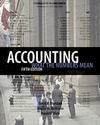 |  Accounting: What the Numbers Mean, 5/e David H. Marshall,
Millikin University
Wayne W. McManus,
International College of the Cayman Islands
Daniel F. Viele,
Webster University
Cost Analysis for Planning
Chapter 14 Learning ObjectivesAfter studying this chapter, you should understand:
1.Cost terminology that relates to the budgeting process. |
 |  |  | 2.Why budgets are useful and how management philosophy can influence the budget process. |
 |  |  | 3.How alternative budget time frames can be used. |
 |  |  | 4.The significance of the sales forecast (or revenue budget) to the overall operating budget. |
 |  |  | 5.How the purchase/production budget is developed. |
 |  |  | 6.The importance of cost behavior patterns in developing the operating expense budget. |
 |  |  | 7.Why a budgeted income statement and balance sheet are prepared. |
 |  |  | 8.How the cash budget is developed. |
 |  |  | 9.Why and how standards are useful in the planning and control process. |
 |  |  | 10.How the standard cost of a product is developed. |
 |  |  | 11.How standard costs are used in the cost accounting system. |
|


 2002 McGraw-Hill Higher Education
2002 McGraw-Hill Higher Education